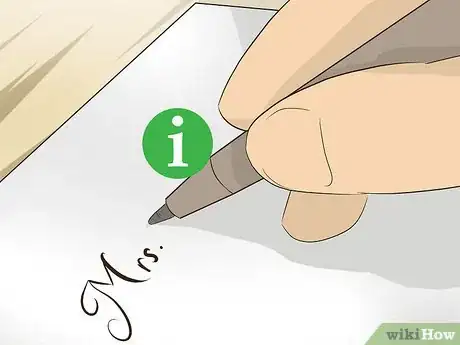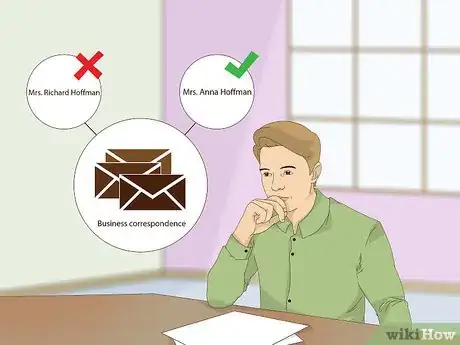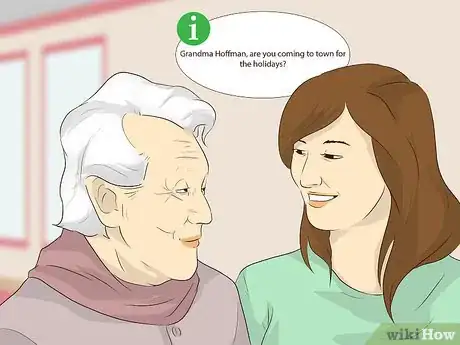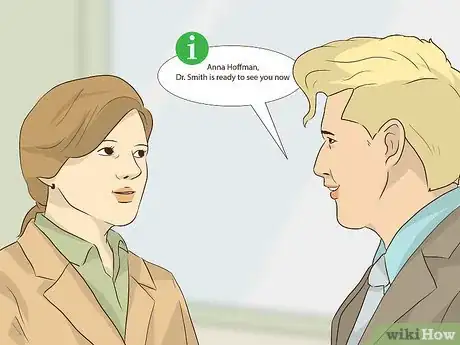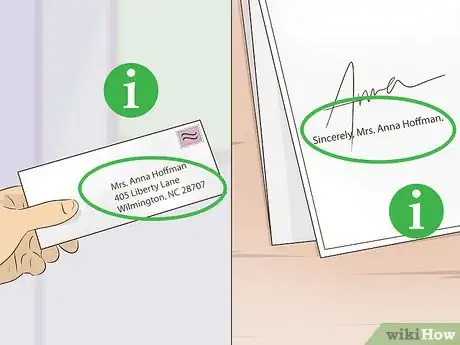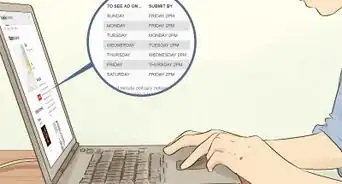This article was co-authored by wikiHow staff writer, Amber Crain. Amber Crain has been a member of wikiHow’s writing staff for the last six years. She graduated from the University of Houston where she majored in Classical Studies and minored in Painting. Before coming to wikiHow, she worked in a variety of industries including marketing, education, and music journalism. She's been a radio DJ for 10+ years and currently DJs a biweekly music program on the award-winning internet radio station DKFM. Her work at wikiHow supports her lifelong passion for learning and her belief that knowledge belongs to anyone who desires to seek it.
This article has been viewed 52,821 times.
Learn more...
There is no legal or universally correct way to address a married woman after her spouse passes away. If you need to address a widow in correspondence, you may feel uncertain and even nervous about which form of her name to use. The most traditional approach is using "Mrs." followed by her spouse's full name. In business correspondence, it's better to use her first name instead of her deceased spouse's. If you feel comfortable enough, you can ask the widow what she prefers.
Steps
Following Traditional Practices
-
1Write “Mrs.” followed by her spouse’s full name. This is the most traditional approach and an appropriate default if you’re unable to ask the widow personally what she prefers. Typically, a widow retains and continues to be addressed by her spouse’s full name until she remarries or requests otherwise.[1]
- For example, if the widow’s deceased spouse’s name was Richard Hoffman, address the envelope to “Mrs. Richard Hoffman.”
-
2Use “Mrs.” followed by her full married name for business matters. When addressing an invitation or other personal correspondence, “Mrs.” followed by the spouse’s full name is traditional and preferred. However, in business correspondence, it’s more appropriate to follow “Mrs.” with her first name and married last name.[2]
- For example, address the widow of Richard Hoffman as “Mrs. Anna Hoffman.”
- Address the widow of Kimberley Bertrand as "Mrs. Stacy Bertrand."
- Business correspondence could include letters to donors, constituents, members, patients, or customers.
Advertisement -
3Use "Mrs." then her married last name to address her in person. Unless you are very close to the widow, address her with the formal title "Mrs." followed by her married last name. If you knew her before her spouse passed away, you will probably still address her the exact same way as before. Unless she requests otherwise, continue referring to her this way.
- For example: "How are you today, Mrs. Hoffman?" or "Mrs. Bertrand, may I ask a question about chapter 14?"
-
4Use her family title followed by her married last name. If your grandfather passed away, continue referring to your grandmother by her familial title followed by her last name. Unless directed otherwise, address her exactly as you did before your grandfather passed away.
- For example: "Grandma Hoffman, are you coming to town for the holidays?" or "Would you like to come with us to the movies, Mrs. Stacy Bertrand?"
-
5Use her first name and married last name in general situations. A widow’s married last name doesn’t revert back to her maiden name when her spouse dies. Her last name will continue to be her married name unless she officially changes it or remarries. If you’re not sure what to use, use her first name followed by her married last name. This form is appropriate in formal, public situations.
- For example: "Anna Hoffman, Dr. Smith is ready to see you now."
Taking Cues or Asking Directly
-
1Avoid using “Ms.” or “Miss” unless requested by the widow. Typically, this form of address is not used unless the widow specifically asks to be addressed that way. For instance, if many years have passed since her spouse died, or if she’s dating someone new, she may want to drop her spouse's full name. The only way to know for certain is to ask her.[3]
- For example: "Hi Aunt Anna! I am mailing you an invitation to Maddox's christening, and I want to make sure I address it properly. I know you've been dating Darrell for several years now; should I stop using 'Mrs.' and Uncle Richard's first name when addressing mail to you?"
-
2Follow the widow’s lead if she’s written to you before. If you’ve received correspondence from the widow since her spouse’s passing, check the return address to see how she referred to herself. Using the name that she used is a good approach, especially if you feel too awkward to bring up such a difficult topic with her directly.[4]
- Check the upper left hand corner of the envelope for the return address. Her preferred name will most likely be written there.
- If the correspondence is formal or business related rather than personal, check the letter itself. If she signed off on the letter, her preferred form may be there. For example, "Sincerely, Mrs. Anna Hoffman."
-
3Ask the widow directly which form she prefers. If you have a personal relationship with the widow and feel comfortable doing so, simply ask her how she would like to be addressed in the future. It’s a difficult topic to bring up, but it’s better for her to receive correspondence that is addressed to her properly.[5]
- You could say: “Hi Aunt Anna! I’m getting ready to mail you a wedding invitation, and I want to make sure I address it properly. Do you still go by Uncle Richard’s full name in correspondence?”
References
- ↑ http://emilypost.com/advice/guide-to-addressing-correspondence/
- ↑ http://www.businesswritingblog.com/business_writing/2007/03/addressing_a_wi.html
- ↑ http://www.formsofaddress.info/Widows.html
- ↑ http://www.businesswritingblog.com/business_writing/2007/03/addressing_a_wi.html
- ↑ http://www.formsofaddress.info/Widows.html
